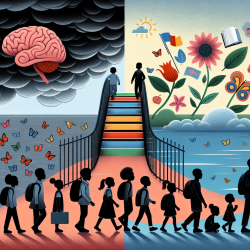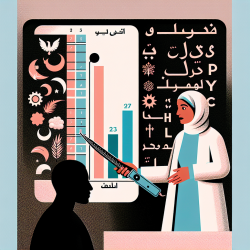Introduction
In the realm of speech-language pathology, understanding the nuanced factors that influence mental health recovery is crucial, especially for children. Recent research titled "Disparities in Mental Health Symptoms Recovery Across Race/Ethnicity and Education Level Following Mild Traumatic Brain Injury" sheds light on significant disparities that can inform practitioners in making data-driven decisions. This blog explores the implications of these findings and offers actionable insights for practitioners dedicated to improving outcomes for children.
Understanding the Research
The study investigated the relationship between race/ethnicity and post-concussive mental health symptoms among service members, focusing on depressive, PTSD, and neurobehavioral symptoms. The research highlighted that non-Whites with higher education levels were more likely to experience elevated depressive symptoms post-treatment compared to their White counterparts. This trend was also observed for PTSD and neurobehavioral symptoms.
Key Findings and Their Implications
For practitioners working with children, these findings underscore the importance of considering both race/ethnicity and education level when assessing mental health recovery post-TBI. Here are some key takeaways:
- Race/Ethnicity Disparities: Non-White children may experience more severe post-treatment symptoms, necessitating culturally sensitive interventions.
- Education Level Impact: Higher education levels in non-White children correlate with increased symptoms, suggesting a need for tailored educational support.
- Cultural Competency: Practitioners should enhance their cultural competency to effectively address the unique needs of diverse populations.
Actionable Strategies for Practitioners
To bridge the gap in mental health recovery, practitioners can implement the following strategies:
- Personalized Care Plans: Develop individualized care plans that consider the child's cultural background and education level.
- Enhance Cultural Competency: Engage in ongoing training to improve understanding of cultural nuances and reduce unconscious biases.
- Collaborative Approaches: Work closely with educators to ensure that educational interventions align with therapeutic goals.
- Community Engagement: Partner with community organizations to provide resources and support tailored to diverse populations.
Encouraging Further Research
While this study provides valuable insights, further research is needed to explore the underlying mechanisms driving these disparities. Practitioners are encouraged to contribute to this body of research by investigating the role of social determinants, access to care, and family dynamics in mental health recovery.
To read the original research paper, please follow this link: Disparities in mental health symptoms recovery across race/ethnicity and education level following mild traumatic brain injury.










